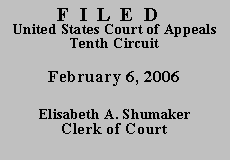

UNITED STATES COURT OF APPEALS
TENTH CIRCUIT
| UNITED STATES OF AMERICA,
Plaintiff - Appellee, v. JEFFREY WILLIAMS, Defendant - Appellant. |
No. 05-5065 (D.C. No. 97-CR-00171-C-1) (Norther District of Oklahoma) |
|
ORDER AND JUDGMENT(*) |
Before KELLY, HENRY, and TYMKOVICH, Circuit Judges.
Jeffrey Dan Williams appeals the district court's denial of his post-conviction motion filed under Fed. R. Civ. P. 60(b). We vacate the order for lack of subject matter jurisdiction, construe Mr. Williams' notice of appeal and appellate briefs as an implied application for authorization to file another 28 U.S.C. § 2255 motion, and deny authorization.
Mr. Williams filed a post-conviction motion in the district court arguing that his sentence was imposed in violation of his Sixth Amendment right to have the jury determine the facts underlying the enhancement of his sentence based on drug quantity, his role in the offense, and obstruction of justice. He relied on the Booker line of cases. See United States v. Booker, 543 U.S. 220 (2005).
Mr. Williams has previously filed post-conviction motions challenging the convictions under attack here. See United States v. Williams, No. 01-5204, 44 Fed. Appx. 443 (10th Cir. Aug. 28, 2002) (unpublished); United States v. Williams, No. 04- 5013 (10th Cir. Jul. 20, 2004) (unpublished).
The motion filed in the district court constituted an unauthorized successive § 2255 motion. See, e.g. United States v. Torres, 282 F.3d 1241, 1246 (10th Cir. 2002) ("[T]o allow a petitioner to avoid the bar against successive § 2255 motions by simply styling a petition under a different name would severely erode the procedural restraint imposed under 28 U.S.C. §§ 2244(b)(3) and 2255.") (citing to Lopez v. Douglas, 141 F.3d 974, 975 (10th Cir.) (holding that a post-judgment Rule 60(b)(6) motion, filed in a habeas proceeding, should be treated as "a second habeas petition under the Antiterrorism and Effective Death Penalty Act ...."), cert. denied, 525 U.S. 1024 (1998)).
The Supreme Court decision in Gonzalez v. Crosby, 125 S.Ct. 2641, 2648, 2651 (2005) (holding that a Rule 60(b) motion filed in a § 2254 case must be treated as a successive habeas petition if it asserts or reasserts a substantive claim to set aside the petitioner's state conviction, as opposed to asserting a defect "in the integrity of the federal habeas proceedings"), does not change this result.
First, the defendant's Rule 60(b) motion seeks to raise a new claim, the legality of his sentence under the Booker line of cases. Second, the Gonzalez court specifically stated that its decision does not apply to § 2255 proceedings. "Federal prisoners generally seek postconviction relief under § 2255, which contains its own provision governing second or successive applications. Although that portion of § 2255 is similar to, and refers to, the statutory subsection applicable to second or successive § 2254 petitions, it is not identical. Accordingly, we limit our consideration to § 2254 cases." 125 S.Ct. at 2646 n. 3.
We will, however, construe Mr. Williams' notice of appeal and appellate briefs as a request for authorization to file another § 2255 motion. See Pease v. Klinger, 115 F.3d 763, 764 (10th Cir. 1997).
We have thoroughly reviewed the matter and conclude that Mr. Williams has failed to make the prima facie showing required by § 2255 as amended by the Antiterrorism and Effective Death Penalty Act. His contentions are not based on newly discovered evidence that, "if proven and viewed in light of the evidence as a whole, would be sufficient to establish by clear and convincing evidence that no reasonable fact finder would have found [him] guilty of the offense" or on a "new rule of constitutional law, made retroactive to cases on collateral review by the Supreme Court, that was previously unavailable." 28 U.S.C. § 2255.
Booker is not retroactive to cases on collateral review. See United States v. Bellamy, 411 F.3d 1182, 1184 (10th Cir. 2005) (holding that "Booker does not apply retroactively to initial habeas petitions."). Nor is it grounds to file another § 2255 motion. See Bey v. United States, 399 F.3d 1266, 1269 (10th Cir. 2005) ("Pursuant to the Supreme Court's holding in [Tyler v. Cain, 533 U.S. 656 (2001)] we must conclude that under the Antiterrorism and Effective Death Penalty Act (AEDPA), Pub. L. No. 104-132, 110 Stat. 1214, Booker may not be applied retroactively to second or successive habeas petitions.").
Accordingly, the district court order is VACATED, and the implied application for authorization to file another § 2255 motion is DENIED. Mr.
Williams' motion to supplement his brief is DENIED.
Entered for the Court
PER CURIAM
*.This order and judgment is not binding precedent, except under the doctrines of law of the case, res judicata and collateral estoppel. The court generally disfavors the citation of orders and judgments; nevertheless, an order and judgment may be cited under the terms and conditions of 10th Cir. R. 36.3.